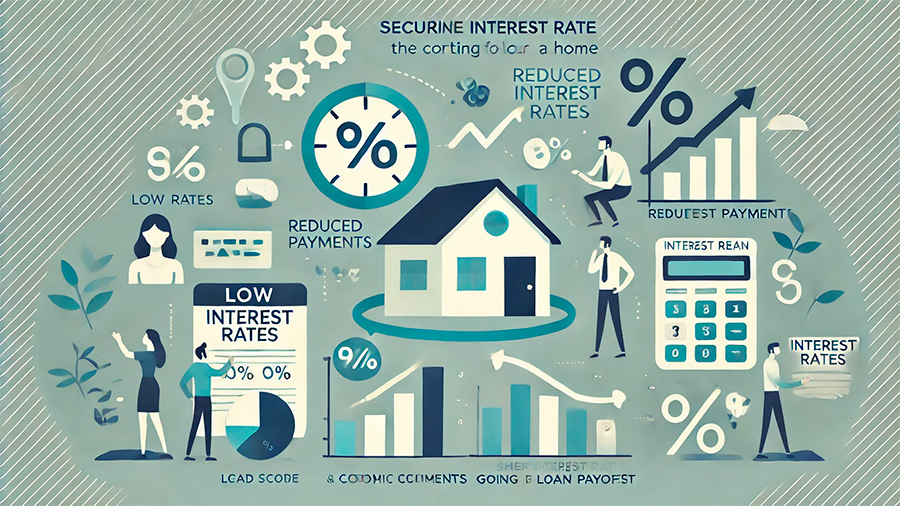Buying a home is a significant financial milestone, but it requires a solid understanding of credit and loans to make informed decisions. Financial literacy equips you with the knowledge needed to navigate the complex mortgage process, helping you secure a loan that aligns with your financial goals and ensuring long-term financial stability. Without this understanding, homebuyers can face higher costs, unfavorable loan terms, and potential financial strain.
At its core, financial literacy involves grasping key aspects like your credit score, the terms of different mortgage loans, and the impact of interest rates on your overall financial health. Understanding these concepts can help you avoid common pitfalls in the homebuying process and empower you to make decisions that benefit your financial future. The ability to navigate credit and loans is crucial in turning the dream of homeownership into a sustainable reality.
The Role of Credit Scores in Homebuying
Your credit score is a fundamental component of the homebuying process. It reflects how well you’ve managed your finances, including past debts, payment histories, and current credit usage. Lenders rely on this score to assess your creditworthiness and determine whether to approve your mortgage application. The better your score, the more likely you are to qualify for a mortgage with favorable terms, including lower interest rates and fewer down payment requirements.
A strong credit score opens doors to better financial opportunities. Conversely, a low score can make it harder to secure a loan and may result in higher interest rates that increase the cost of homeownership over time. Improving your credit score before applying for a mortgage is an important step in ensuring you get the best possible loan terms. This involves reviewing your credit report, resolving any errors, paying down outstanding debts, and consistently making on-time payments.

How Credit History Affects Mortgage Approval
In addition to your credit score, your overall credit history plays a major role in the mortgage approval process. Lenders don’t just look at your score in isolation; they examine your credit report to evaluate your financial habits over time. A good credit history, marked by responsible use of credit and timely payments, signals to lenders that you’re capable of handling long-term financial commitments like a mortgage.
Lenders are wary of borrowers with red flags in their credit history, such as missed payments, maxed-out credit cards, or a high debt-to-income ratio. These issues can lead to higher interest rates or even denial of your loan application. However, a positive credit history increases your chances of securing a mortgage with terms that are favorable to your financial situation, such as lower interest rates and reduced down payment requirements.
Financial literacy helps you understand how lenders assess credit history and what you can do to improve yours. By focusing on maintaining a low level of debt, avoiding new credit inquiries, and resolving any outstanding financial issues, you can present yourself as a reliable borrower.
Choosing the Right Mortgage for Your Needs
Securing the right mortgage is another area where financial literacy is critical. Mortgages come in various forms, and understanding the differences between them is essential for selecting a loan that fits your financial situation. The two main types of mortgages are fixed-rate and adjustable-rate mortgages (ARMs).
A fixed-rate mortgage offers consistent monthly payments throughout the life of the loan. This stability makes it easier to budget, as you’ll know exactly what to expect each month. On the other hand, an adjustable-rate mortgage starts with lower initial payments but fluctuates based on market conditions, which can result in higher payments down the line.
Financial literacy enables you to evaluate the risks and benefits of each option. If you value stability and predictable payments, a fixed-rate mortgage may be the better choice. If you’re comfortable with some uncertainty and are focused on lower payments in the short term, an ARM might be more appealing. Understanding how these options impact your financial future allows you to make an informed decision that supports your long-term goals.

The Impact of Interest Rates on Your Mortgage
Interest rates have a profound effect on the cost of borrowing money to buy a home. Even a small change in interest rates can significantly affect your monthly mortgage payments and the total amount you’ll pay over the life of the loan. A lower interest rate means more of your payment goes toward the principal, allowing you to pay off the loan faster and reducing the total interest paid.
Interest rates are influenced by factors such as economic conditions, your credit score, and the type of loan you choose. Financial literacy equips you with the knowledge to secure the best possible interest rate by improving your credit score, reducing your debt-to-income ratio, and comparing loan offers from multiple lenders. Understanding how interest rates affect your mortgage ensures that you make a decision that aligns with your budget and financial goals.
Preparing for the Costs of Homeownership
Financial literacy goes beyond securing a mortgage; it also involves understanding the full scope of costs associated with buying and owning a home. These costs include closing fees, property taxes, homeowners insurance, and maintenance expenses. Being prepared for these additional financial responsibilities helps ensure that homeownership remains a sustainable investment rather than a financial burden.
When you’re financially literate, you’ll know how to budget for these ongoing costs and factor them into your overall financial planning. For instance, closing costs can range from 2% to 5% of the home’s purchase price, and property taxes vary by location. Planning for these expenses upfront helps avoid surprises and allows you to manage your finances more effectively once you’ve purchased your home.
Building Financial Literacy for Long-Term Success
The journey toward homeownership doesn’t end once you’ve secured a mortgage. Maintaining financial literacy is crucial for managing your mortgage payments, handling home-related expenses, and staying financially secure in the long term. A deep understanding of your loan terms, interest rate fluctuations, and budgeting for home maintenance is key to sustaining homeownership without unnecessary financial stress.
Financially literate homeowners are also better equipped to take advantage of opportunities like refinancing, which can lower monthly payments or reduce the total interest paid on the loan. Additionally, staying informed about your credit and financial health allows you to continue building wealth through home equity and other investments.
Conclusion
Financial literacy is essential for navigating credit and loans in the homebuying process. Understanding how your credit score, credit history, and loan options impact your mortgage can help you secure favorable terms, lower interest rates, and long-term financial success as a homeowner. By applying financial literacy skills, you can make informed decisions that align with your goals and create a stable foundation for your future.



